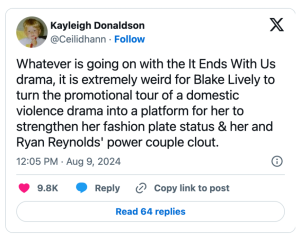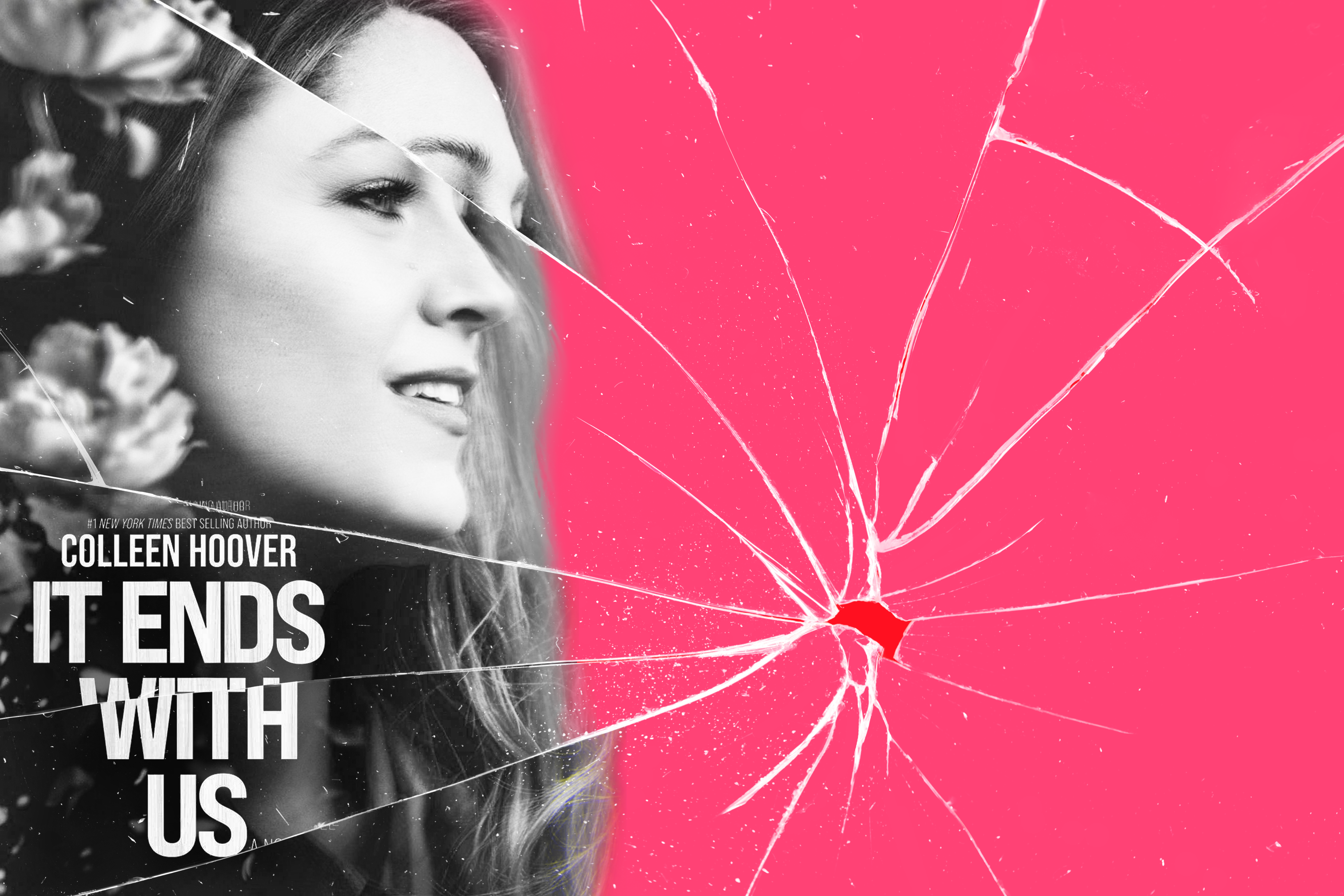Table of Contents
ToggleWhat the Blake Lively Conversation is Missing
In This Post
Blake Lively is more than an actress – she’s a multi-hyphenate brand, and that’s exactly where things go wrong. This post breaks down how her persona, products and celebrity image collide – and why Gen Z is calling her out on it.
“Based on a best-selling Colleen Hoover novel, “It Ends With Us” is ultimately about breaking the cycle of domestic violence that entraps one generation after another,” The New York Times reported, describing the movie adaptation of the popular book.
The controversy surrounding the release of “It Ends With Us” in the media, propelled by the alleged feud between actress Blake Lively and Justin Baldoni, the movie’s director, is in itself par for the course.
The rumours tell a Hollywood tale as old as time (difficult actors, drama on set). But the ramifications of the ongoing feud, spurred by both parties’ respective PR teams (Baldoni recently hired the PR crisis firm that Johnny Depp employed during his trial with Amber Heard) highlights a significant cultural shift taking place.
The feud sparked a wave of criticism against Blake, churning up old, awkward interviews, negative reviews of her recently launched haircare line and a torrent of allegations incriminating her character. The lines between her roles as an actress, businesswoman, brand and person have been blurred, and according to the internet, they’re all bad.
What’s missing from the Blake Lively conversation is the greater picture, a consideration of shifting powers that have reshaped the definition of a modern celebrity.
This post looks past the headlines to examine the Blake Lively personal brand: how the It Ends With Us controversy, her haircare and beverage lines, and Gen Z’s values collide to create a PR mess. It’s less about picking a side and more about what this moment reveals about celebrity personal brands in 2024. It also fits into a bigger pattern we’re seeing in culture: microtrends, parasocial relationships and aesthetics moving faster than legacy celebrity PR can keep up.
So what does it take to be a celebrity with a brand today? And where did Blake go wrong? The answer lies with Gen Z.
The value of connection, according to Gen Z
Gen Z is a powerful consumer base, with widespread voices across social media and $450 billion in spending power worldwide, making the population an important demographic to target.
Being rich, famous and beautiful doesn’t guarantee a successful product launch anymore — everyone has a brand, and in a sea of never-ending content, younger consumers are looking to feel a sense of connection with the celebrities they follow online. This is represented by the rise of TikTok stars and the success of direct-to-consumer brands like Rhode and Djerf Avenue.
These brands, both helmed by modern celebrities and online it-girls Hailey Bieber and Matilda Djerf, market to their consumers like they exist in a girly-pop ecosystem, where nothing is wrong and everyone is poreless. They create micro-trends (for example, Hailey Bieber’s “Strawberry Summer”), and then they sell products to their consumers that complement the trend or aesthetic. On social media, this is done through casual-seeming TikToks, filmed up close, of Miss Bieber applying blush, talking to the camera, or Matilda Djerf getting dressed in the morning.
Today, particularly for Gen Z, our desired relationship to modern celebrities is parasocial. We think that we know the person on the other side of the screen, and it makes us trust their product recommendations and the authenticity of their personal brands. And, as a generation that has grown up online, we can tell when someone is pushing product for a money-grab, versus creating a business to pursue their passion.
For Gen Z, the bar for celebrity personal brands is high: they want creators and celebrities who feel like real people first, marketers second. That’s why casual, close-up TikToks from Hailey Bieber or Matilda Djerf land so well – they feel like a friend showing you their routine, not a spokesperson reading a script. We see the same thing in viral interview formats and faux “dates” where audiences show up for the chemistry and connection first, and only clock the promo second. The dynamic isn’t limited to beauty and fashion; BookTok has turned authors and covers into parasocial crushes too.
The age of the multi hyphenate
While celebrity personas have always mattered, in the Goopy digital age, A-listers are increasingly becoming multi-hyphenates.
Traditional movie stars are a dying breed — old Hollywood beauties, who acted in movies, walked red carpets and accepted awards, are rare, in a hyper-online world in which the line between actor, model and online figure is increasingly blurred.
“People like Charlie Chaplin, Marilyn Monroe, and Elvis Presley became household names, not only for their talents but also for their carefully crafted public personas,” an essay published on Medium regarding the “Rise, Fall and Irrelevance of Celebrity Culture” notes.
In order to understand how this affects Blake Lively, consider that today, more people than ever can become, as was once said about Kim Kardashian, “famous for being famous.” As such, A-listers who ascended to the top through traditional avenues, long before younger generations of modern celebrities grew followings online, can seem particularly out of touch. Fame is no longer an exclusive commodity, and this new reality has upset our idolization of powerful figures.
In an interview with the University of Columbia’s magazine, Sharon Marcus, a Professor of English and Comparative Literature at Columbia and author of the book The Drama of Celebrity, said:
“Today you have so-called microcelebrities, for example those who are famous on YouTube. Some have ten million followers or more, yet many of us have never heard of them. I think it’s going to be interesting to see what happens to celebrity culture when it ceases to be a set of common reference points. In 1964, you could be a seventy-five-year-old who didn’t like the Beatles, but you knew who they were. Celebrity is no longer a common bond uniting generations.”
Blake’s greatest misstep in her marketing and PR approach to the “It Ends with Us” press tour is her lack of “common reference points.”
In this landscape, a successful celebrity personal brand isn’t just about fame; it’s about staying in conversation with younger audiences who grew up online and are used to micro-celebrities who talk to them directly every day. That’s part of why shifts in platforms like TikTok feel so seismic – they’re where the next wave of multi-hyphenate celebrity brands are being built in real time.
Why Blake’s approach isn’t working
“Blake’s marketing strategies have a huge gap,” a video essay on Blake’s alleged mean-girl antics purported.

The gap in Blake’s (and her team’s) marketing techniques lie between the celebrity persona she presents to the public and the products marketed at the same time as the movie (ie., her hair care company Blake Brown Beauty and her beverage line, Betty Buzz).
There’s aggravation online about her personal peddling, by the way she’s pushing her new hair care line and alcohol line and cocktail mixer line and her husband and their family image and the florals (oh, the florals), while promoting a movie about domestic violence. It comes across as inauthentic, and we’re insulted by the insinuation that we would buy into what she’s attempting to sell.
The disconnect between Blake’s brands and the movie she’s promoting, situated within the context of modern celebrity culture, is where the gap lies — and it may be too wide for her to bridge. In my opinion, Blake should not have marketed her other brands at the same time as the movie. As an A-list celebrity with a powerful voice, she should have compassionately and thoughtfully discussed domestic violence during the movie’s press tour. But examining the factors at play that cultivated this perfect storm, and speak to the current state of celebrity brands and culture, is more interesting than hating on one tone-deaf PR nightmare.
Being able to cast a wide net with your reach is extremely powerful, but knowing how to use your voice to connect with your audience is essential.
From a brand perspective, the problem isn’t that Blake has other ventures; it’s that the Blake Lively personal brand she’s projecting – family-friendly cocktails, glossy haircare, peppy florals – clashes with the gravity of It Ends With Us. The values and tone attached to her products don’t line up with the story she’s supposed to be amplifying, so everything feels off. It’s a similar disconnect to what we saw with the Poppi and Bon Appétit scandals, where trendy campaigns and product pushes collided with deeper issues around tone, integrity and audience trust. It’s a reminder that you can’t treat every serious project as just another slot in your promo calendar; some stories call for brand-first thinking, not just more social content.
Final Thoughts
If you’re looking to create an authentic relationship with your business’ community through a strong brand voice and cohesive aesthetic, we can help. With our fingers on the pulse of the current climate, we’ll work with you to nurture your consumer base from the ground up, with integrity.
As a digital marketing agency in Toronto and creative agency, we help brands – celebrity and otherwise – build personal brands that actually line up with their products and values. Explore our range of marketing and creative services or get in touch to talk about your brand strategy.
FAQs
Blake has been receiving negative attention for the way that she has highlighted her personal brands while promoting her latest project, “It Ends with Us,” a movie about domestic violence.
“It Ends with Us” is a 2016 romance novel by Colleen Hoover that details an increasingly abusive relationship, and one woman’s escape from it. The book was turned into a movie that was recently released.
The disconnect between the story’s subject matter and Blake’s light, product-focused promo strategy is a big part of why people are frustrated.
Blake Brown Beauty has been receiving negative feedback. The return rate is high and people think that the packaging isn’t *cute*.
It’s a reminder that even the strongest celebrity can’t fully carry a product if the experience and design don’t deliver.




